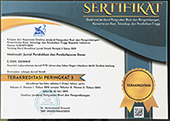Multicultural Classroom Management: Strategies for Managing the Diversity of Students in Elementary Schools and Madrasah Ibtidaiyah
Abstract
A comfortable classroom environment cannot be separated from the role of the teacher in managing the learning environment. Heterogeneous classroom conditions are a challenge for teachers to create a conducive and meaningful learning atmosphere. This is because each student has different characters, needs, and potentials that need to be developed. On the other hand, the heterogeneity of students if not managed properly can be a source of various problems in the classroom. Starting from bullying, the learning atmosphere is uncontrollable, even the attitude of antipathy to diversity triggers other negative attitudes, such as discrimination and injustice. Therefore, to overcome this problem, it requires the ability of teachers to create a classroom environment that respects diversity (multicultural). Based on this view, multicultural class management is needed. This is because multicultural classroom management is believed to be able to foster student diversity while still adhering to universal human values that are just and in favor of equality. Multicultural classroom management is also able to provide educational services that are by human needs, and respect differences with the human approach. On this basis, this study discusses teacher strategies in managing the diversity of students using a multicultural classroom management approach. Multicultural classroom management needs to be developed to create a more humanist and democratic learning atmosphere which is needed to foster the diversity of students in the classroom. Among the multicultural class management strategies that can be carried out are managing gender diversity, social status, ethnicity, including intelligence
Keywords
Full Text:
PDFReferences
Amstrong, Thomas. (2002). Setiap Anak Cerdas: Panduan Membantu Anak Belajar Dengan Memanfaatkan Multiple Intelligence-Nya. Jakarta: PT. Gramedia Pustaka.
Arends, Richard I. (2008). Learning to Teach (Seventh Edition). New York: McGraw Hill Companies.
Arikunto, Suharsimi. (1992). Pengelolaan Kelas Dan Siswa. 3rd ed. Jakarta: CV. Rajawali.
Dale H, Schunk. (2012). Learning Theories an Educational Perspective. Sixth Edition. Yogyakarta: Pustaka Pelajar.
Erwinsyah, Alfian. (2017). “Manajemen Kelas Dalam Meningkatkan Efektifitas Proses Belajar Mengajar.” TADBIR: Jurnal Manajemen Pendidikan Islam. https://journal.iaingorontalo.ac.id/index.php/tjmpi/article/view/392
Hamka, Abdul Aziz. (2012). Pendidikan Karakter Berpusat Pada Hati. Jakarta Selatan: Al-Mawardi Prima.
Imron, Ali dkk. (2003). Manajemen Pendidikan. Malang: Universitas Negeri Malang.
M. Syaom Barliana. (2008). Pengembangan Program Pendidikan IPS Berbasis Multikultural. Konvensi Nasional Pendidikan Indonesia VI (Konaspi). Bali.
Mustafida, Fita, Abd, Gafur. (2019). Strategi Pengelolaan Kelas (Teori Dan Praktek Menciptakan Lingkungan Kelas Multikultural). Malang: UIN-Malang Press.
Mustafida, Fita. (2016). “Strategi Menciptakan Iklim Kondusif Di SD/MI (Sebuah Kajian Pedagogis Dan Psikologis).” Madrasah. doi: 10.18860/jt.v8i2.3775.
Nawawi, Hadari. (1982). Organisasi Sekolah Dan Pengelolaan Kelas Sebagai Lembaga Pendidikan. Jakarta: Gunung Agung.
Parker, Christina. (2016). Peace Building Citizenship, and Identity (Empowering Conflict and Dialogue in Multicultural Classroom). Boston: Sense Publisher.
De Porter, Bobby, trj. Ary Nilandari. (2010). Quantum Teaching (Orchestrating Student Sucses). Terjemah Quantum Teaching (Mempraktekkan Quantum Learning Di Ruang-Ruang Kelas). Bandung: Kaifa.
Ritzer, George. (1991). Sociology: Experiencing a Changing Society. Boston: Allyn and Bacon.
Suteja, Jaja. (2017). “Dampak Pola Asuh Orang Tua terhadap Perkembangan Sosial-Emosional Anak.” AWLADY : Jurnal Pendidikan Anak. doi: 10.24235/awlady.v3i1.1331.
Surata, Agus dan Tuhana Taufiq Andrianto. (2001). Atasi Konflik Etnis. Jogjakarta: Global Pustaka Utama.
Syarifah, Hidayatus. (2017). “Pendidikan dalam Keluarga.” Raudhah Proud To Be Professionals : Jurnal Tarbiyah Islamiyah. doi: 10.48094/raudhah.v2i1.18.
Tilaar, HAR. (2003). Kekuasaan Dan Pendidikan. Magelang: Indonesia Tera.
Wulandari, Retno, Burhannudin Ichsan, and Yusuf Alam Romadhon. (2017). “Perbedaan Perkembangan Sosial Anak Usia 3-6 Tahun dengan Pendidikan Usia Dini dan Tanpa Pendidikan Usia Dini di Kecamatan Peterongan Jombang.” Biomedika. doi: 10.23917/biomedika.v8i1.2900.
Yaqin, M. Ainul. (2005). Pendidikan Multikultural: Cross-Cultural Understanding Untuk Demokrasi Dan Keadilan. Yogyakarta: Pilar Media.
Zamroni. (2011). Pendidikan Demokrasi Pada Masyarakat Multikultural. Yogyakarta: Gavin Kalam Utama.
DOI: https://doi.org/10.18860/mad.v13i2.11061
Copyright (c) 2021 Madrasah: Jurnal Pendidikan dan Pembelajaran Dasar

This work is licensed under a Creative Commons Attribution-NonCommercial-ShareAlike 4.0 International License.
INDEXED & SUPPORTED BY:
Madrasah: Jurnal Pendidikan dan Pembelajaran Madrasah is licensed under a Creative Commons Attribution-ShareAlike 4.0 International License.
EDITORIAL OFFICE
Fakultas Ilmu Tarbiyah dan Keguruan
Universitas Islam Negeri Maulana Malik Ibrahim Malang
Jalan Gajayana 50 Malang 65144, Jawa Timur, Indonesia
Telp/Fax: +62341-552398
Email: madrasah@uin-malang.ac.id
Website:https://ejournal.uin-malang.ac.id/index.php/madrasah




















